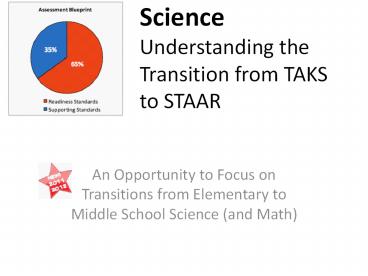Science Understanding the Transition from TAKS to STAAR - PowerPoint PPT Presentation
1 / 17
Title:
Science Understanding the Transition from TAKS to STAAR
Description:
Science Understanding the Transition from TAKS to STAAR An Opportunity to Focus on Transitions from Elementary to Middle School Science (and Math) – PowerPoint PPT presentation
Number of Views:152
Avg rating:3.0/5.0
Title: Science Understanding the Transition from TAKS to STAAR
1
ScienceUnderstanding the Transition from TAKS to
STAAR
- An Opportunity to Focus on Transitions from
Elementary to Middle School Science (and Math)
2
http//www.tea.state.tx.us/student.assessment/staa
r/
3
Assessment Blueprint
(scroll down web page)
4
A Way Into Understanding the Shift from TAKS to
STAAR
5
READINESS Receives More than 4 Times the Emphasis
Over Supporting as Presented in TEKS
TEKS Readiness
2.167
4.33
2.000
TEKS Supporting
6
What does this look like in the Assessment
Blueprint?
7
TEKS
STAAR
8
TEKS
STAAR
9
Readiness Supporting Standards
- Readiness standards have the following
characteristics. They are essential for success
in the current grade or course. They are
important for preparedness for the next grade or
course. They support college and career
readiness. They necessitate in-depth
instruction. They address broad and deep ideas. - Supporting standards have the following
characteristics. Although introduced in the
current grade or course, they may be emphasized
in a subsequent year. Although reinforced in the
current grade or course, they may be emphasized
in a previous year. They play a role in
preparing students for the next grade or course
but not a central role. They address more
narrowly defined ideas.
10
Focus Fewer Skills, Deeper, Higher Cognitive
Complexity, Rigor Increased , Growth of
Higher-Achieving Students
- consistent with a growing national consensus
regarding the need to provide a more clearly
articulated K16 education program that focuses
on fewer skills and addresses those skills in a
deeper manner, the Texas Education Agency (TEA)
is implementing a new assessment model for the
STAAR tests for elementary, middle, and high
school. - TEA is also implementing a number of changes that
should serve to test knowledge and skills in a
deeper way. Tests will contain a greater number
of items that have a higher cognitive complexity
level. Items will be developed to more closely
match the cognitive complexity level evident in
the TEKS. - o Assessments will increase in length at most
grades and subjects. o Overall test difficulty
will be increased by including more rigorous
items. o The rigor of items will be increased by
assessing skills at a greater depth and level of
cognitive complexity. In this way, the tests will
be better able to measure the growth of
higher-achieving students.
11
These are THE Topics from 3rd to 8th Grade
12
Needs to be Understood Before Shifting to Back to
Assessed Curriculum
13
What curriculum starts to look like
2011-2012 from New Yearly Itinerary Grades 3,
4, 5, and 8 Note the Similarity
3rd
4th
5th
8th
The Curriculum Road Maps are not (yet) updated
but to the extent they seem to reflect the basic
structure of Instructional Planning Guides that
are organized by sequences of pages in existing
textbooks NOT CONSISTENT with this level of
alignment, there is a NEED/OPPORTUNITY to look
for other materials or approaches that could be
organized in terms of BIG IDEAS.
http//www.austinschools.org/curriculum/science/el
/3rd/index.html
14
Lamar Science
- A Theme There are important and challenging
transitions students need to make in mathematics
and science in moving from elementary school to
middle school and these transitions need to
addressed directly and inclusively if we want all
students to be successful.
http//generative.edb.utexas.edu/materials/all.htm
15
Some of theTransitions in Math
- 4 - 6
- Repeated Addition Model of Multiplication Breaks
- X goes from unknown to variable
- http//generative.edb.utexas.edu/materials/aisd.h
tm
A Theme There are important and challenging
transitions students need to make in mathematics
and science in moving from elementary school to
middle school and these transitions need to
addressed directly and inclusively if we want all
students to be successful. Examples in Math
Above in Science next page.
16
Some Transitions in Science
- Intensive and Extensive
- Dynamics (Rate Amount)
- Micro Macro
- Materials
- ? Example Different amounts of Water, same
Blue-ness (intensive) - http//generative.edb.utexas.edu/materials/all.ht
m
17
(No Transcript)































